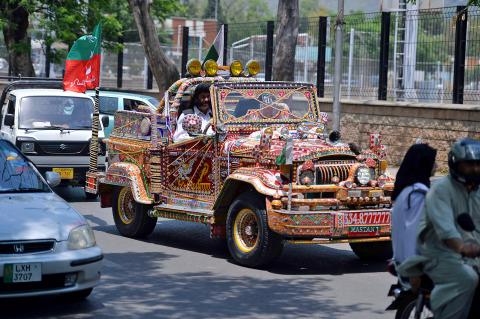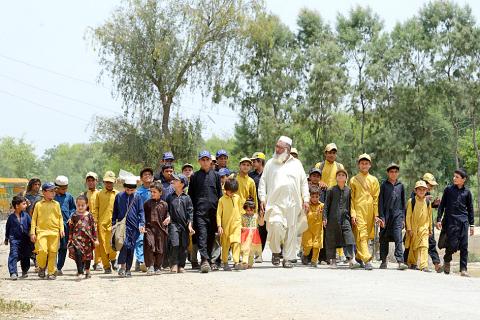Three men who have fathered nearly 100 children among them are doing their bit for Pakistan’s skyrocketing population, which is being counted for the first time in 19 years.
However, in a nation where experts warn that the surging populace is gouging into hard-won economic gains and social services, the three patriarchs are unconcerned.
Allah will provide, they say.

Photo: AFP
Pakistan has the highest birth rate in South Asia at about three children per woman, according to the World Bank and Pakistani government figures, and the census is expected to show that growth remains high.
“God has created the entire universe and all human beings, so why should I stop the natural process of a baby’s birth?” said Gulzar Khan, a father of 36, citing one of the strongest influences in the region: the belief that Islam prohibits family planning.
Tribal enmity is another factor in the northwest, where the 57-year-old lives in the city of Bannu with his third wife, who is pregnant.

Photo: AFP
“We wanted to be stronger,” Khan told reporters surrounded by 23 of his offspring
So many, he said. They do not need friends to play a full cricket match.
Polygamy is legal, but rare in Pakistan, and families like Khan’s are not the norm, although the beliefs he holds are widespread.

Photo: AFP
The previous census, in 1998, showed that Pakistan had a population of up to 135 million.
Estimates suggest the new census — carried out earlier this year, with the preliminary results due by the end of next month — will put the figure closer to 200 million. The economy is expanding faster than it has in a decade and last month Islamabad hiked its development budget by 40 percent.
However, observers have said that the population boom is negating any progress, using up resources in a young country where jobs are scarce and nearly 60 million people live below the poverty line.
“It definitely is a problem, because it is affecting health outcomes adversely and also eating into development gains,” said Zeba Sathar, country director for the UN population council.
Sathar said the census would show that growth has slowed due to lower fertility rates, though she said it would remain among the highest rates in the region.
“There has to be a clear enunciation of need to slow growth as a positive policy lever and then next a good, effective health system that provides information and services of quality,” she said.
Khan’s brother, Mastan Khan Wazir — one of his 15 siblings — also has three wives.
So far, Wazir has only fathered 22 children, but, like his brother, he says his grandchildren are too numerous to count.
The 70-year-old, with his bushy moustaches and bejewelled fingers, is a minor celebrity in North Waziristan tribal district, where his blinged out jeep — done in the style of Pakistan’s famous “jingle trucks,” with Pashto music pouring from the stereo — is a familiar sight.
“God has promised that he will provide food and resources, but people have weak faith,” he told reporters, wearing a traditional Waziristani turban.
In the southwestern city of Quetta in Balochistan Province, Jan Mohammed — the father of 38 children — agreed, despite having previously called on the government to provide resources for his family.
Jan last year said he was looking for a fourth wife as he continues his mission of having 100 children.
No woman has yet agreed, but he has not given up, he said.
“The more Muslims grow, the more their enemies will fear them... Muslims should go for more and more children,” he said.
Denied their husbands’ permission to speak, none of the three men’s wives could give their views.
There is “abundant” awareness in Pakistan about the need for birth spacing, or allowing a woman’s body to rest for at least 18 months between pregnancies, Sathar said.
“The need is for clear information about the methods available, how they work, their possible side effects and where to get them. That is missing,” she added.
Giving women more of a choice in the matter could help, said Aisha Sarwari, a feminist who has previously written on population and women’s rights.
“Access to birth control for women can be a game changer,” she said. “Ultimately the impact is that there are more resources to go around... Empowered women have fewer children and this creates a mindset that leads to prosperity within families that is likely to be emulated across communities.”
Khan said there could be some benefits to slowing down.
For one thing, tribal enmity in the northwest has decreased in recent years, he said.
“Now, with the grace of God, the situation has changed — war and fighting is finished — so, now, a decrease in the population would not be bad,” he said.
It would also free him up for other leisure activities, he said, adding: “If one had fewer children, one would have more time to make love with his wives.”

Australia has announced an agreement with the tiny Pacific nation Nauru enabling it to send hundreds of immigrants to the barren island. The deal affects more than 220 immigrants in Australia, including some convicted of serious crimes. Australian Minister of Home Affairs Tony Burke signed the memorandum of understanding on a visit to Nauru, the government said in a statement on Friday. “It contains undertakings for the proper treatment and long-term residence of people who have no legal right to stay in Australia, to be received in Nauru,” it said. “Australia will provide funding to underpin this arrangement and support Nauru’s long-term economic

‘NEO-NAZIS’: A minister described the rally as ‘spreading hate’ and ‘dividing our communities,’ adding that it had been organized and promoted by far-right groups Thousands of Australians joined anti-immigration rallies across the country yesterday that the center-left government condemned, saying they sought to spread hate and were linked to neo-Nazis. “March for Australia” rallies against immigration were held in Sydney, and other state capitals and regional centers, according to the group’s Web site. “Mass migration has torn at the bonds that held our communities together,” the Web site said. The group posted on X on Saturday that the rallies aimed to do “what the mainstream politicians never have the courage to do: demand an end to mass immigration.” The group also said it was concerned about culture,

ANGER: Unrest worsened after a taxi driver was killed by a police vehicle on Thursday, as protesters set alight government buildings across the nation Protests worsened overnight across major cities of Indonesia, far beyond the capital, Jakarta, as demonstrators defied Indonesian President Prabowo Subianto’s call for calm. The most serious unrest was seen in the eastern city of Makassar, while protests also unfolded in Bandung, Surabaya, Solo and Yogyakarta. By yesterday morning, crowds had dispersed in Jakarta. Troops patrolled the streets with tactical vehicles and helped civilians clear trash, although smoke was still rising in various protest sites. Three people died and five were injured in Makassar when protesters set fire to the regional parliament building during a plenary session on Friday evening, according to

STILL AFLOAT: Satellite images show that a Chinese ship damaged in a collision earlier this month was under repair on Hainan, but Beijing has not commented on the incident Australia, Canada and the Philippines on Wednesday deployed three warships and aircraft for drills against simulated aerial threats off a disputed South China Sea shoal where Chinese forces have used risky maneuvers to try to drive away Manila’s aircraft and ships. The Philippine military said the naval drills east of Scarborough Shoal (Huangyan Island, 黃岩島) were concluded safely, and it did not mention any encounter with China’s coast guard, navy or suspected militia ships, which have been closely guarding the uninhabited fishing atoll off northwestern Philippines for years. Chinese officials did not immediately issue any comment on the naval drills, but they